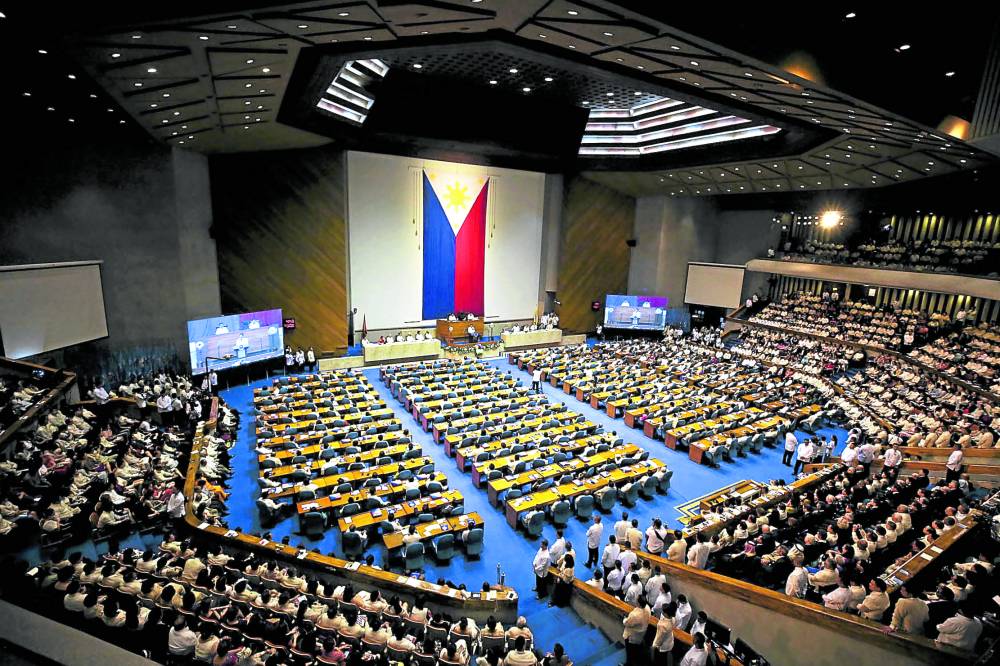
Ahead of President Ferdinand Marcos Jr.’s third State of the Nation Address, the JFC and other prominent business groups have endorsed 21 pending legislative measures for prioritization to help improve the overall investment environment in the country. —Malacañang photo
MANILA, Philippines — Less than a week before President Ferdinand Marcos Jr. delivers his third State of the Nation Address (Sona), the business community on Tuesday endorsed 21 pending legislative measures for prioritization to help improve the overall investment environment in the country.
The Joint Foreign Chambers of the Philippines (JFC) and other prominent business groups said they were endorsing these reforms ahead of the President’s Sona on July 22 to drive economic growth, enhance global competitiveness, and promote inclusive development.
“With one year left in the current Congress, we believe that the 21 measures are achievable reforms that will generate substantial impact in [reaching] our shared vision of inclusive growth through job generation, poverty reduction, and global competitiveness,” the coalition said in a statement.
READ: Senators wish for Marcos to tackle Pogo ban in Sona
“We will continue to work with Congress and your administration in support of these remaining reforms as we look forward to your third (Sona),” the letter added.
On top of the list is the liberalization of foreign equity restrictions in the Constitution, an issue that has become divisive in Congress owing to fears that it might be used as a vehicle for political changes to the Charter.
The other proposed legislation are less controversial, with a number of them pertaining to digitalization, some on improving workers’ welfare and productivity, and a few seeking the creation of new government agencies.
Heading the list of digitalization measures is the Konektadong Pinoy bill, which seeks to lower barriers and cost to entry for data service providers, promote sharing of infrastructure and efficient use of resources, and eventually lower internet costs for Filipinos.
The private sector is also pushing for amendments to the E-Commerce Act and the Intellectual Property Code to modernize and align these with the country’s treaty obligations and international best practices.
It said the bill promoting digital payments would help improve the business climate by mandating the use of safe and efficient digital or electronic modes of payments by all national government agencies, government-owned and -controlled corporations, and local government units.
The industry group likewise listed the Satellite-based Technologies Promotion Act as important to ease regulatory requirements for the use of satellite-based internet technologies to connect unserved and underserved communities.
Productivity measures
For labor, the business community said the government should prioritize the bill calling for a national unemployment insurance program to protect workers from income loss due to retrenchment by providing unemployment benefits while they seek new jobs.
It also pushed the amendments to the Corporate Recovery and Tax Incentives for Enterprises Act and the Philippine Economic Zone Authority Act to allow locators greater flexibility in setting work-from-home and other flexible arrangements.
It said lawmakers should also prioritize the proposed Holiday Rationalization Act to refine the number of nonworking holidays and make it comparable to those of neighboring countries and to reduce business costs.
It also called for further reforms the current apprenticeship program to make it more attractive to both enterprises and prospective apprentices.
Also needed are the amendments to the Secrecy of Bank Deposits law to allow the Bangko Sentral ng Pilipinas to examine, inquire, or look into deposits under certain conditions related to unlawful activities, and the passage of the Freedom of Information Act to provide the parameters and mechanisms for citizens’ access to information in all government offices.
The group likewise called for the creation of a Philippine Airports Authority that will handle the regulation and operation of all airports to improve safety and efficiency, as well as an amendment to the charter of the Philippine Ports Authority (PPA) that will transfer all PPA-operated ports to a more capable separate public sector entity.
Health care, pension reforms
The bill creating the Department of Disaster Resilience is also being supported by the business sector to lead in the planning, coordination, monitoring, oversight and implementation of disaster risk and vulnerability reduction and management.
The remaining bills that need to be prioritized, according to the private sector, are the Capital Income and Financial Taxes Reform; Pandemic Protection Act to prevent the overburdening of the health-care system; Philippine Pension System reforms; repeal of the Commonwealth Act 138 (Flag Act) to remove the 15-percent domestic preference in awarding public works contracts; easing of agricultural land ownership by raising the landholding ceiling from five hectares to 24 hectares and easing restrictions on farm land transactions, and the International Maritime Trade Competitiveness Act.
The JFC is a coalition of the American, Australian-New Zealand, Canadian, European, Japanese and Korean business chambers, as well as the Philippine Association of Multinational Companies Regional Headquarters. The other signatory groups include the Association of International Shipping Lines, the Chamber of Customs Brokers, the Confederation of Wearable Exporters of the Philippines, the Makati Business Club, the Management Association of the Philippines, and the Semiconductor and Electronics Industries in the Philippines Foundation.